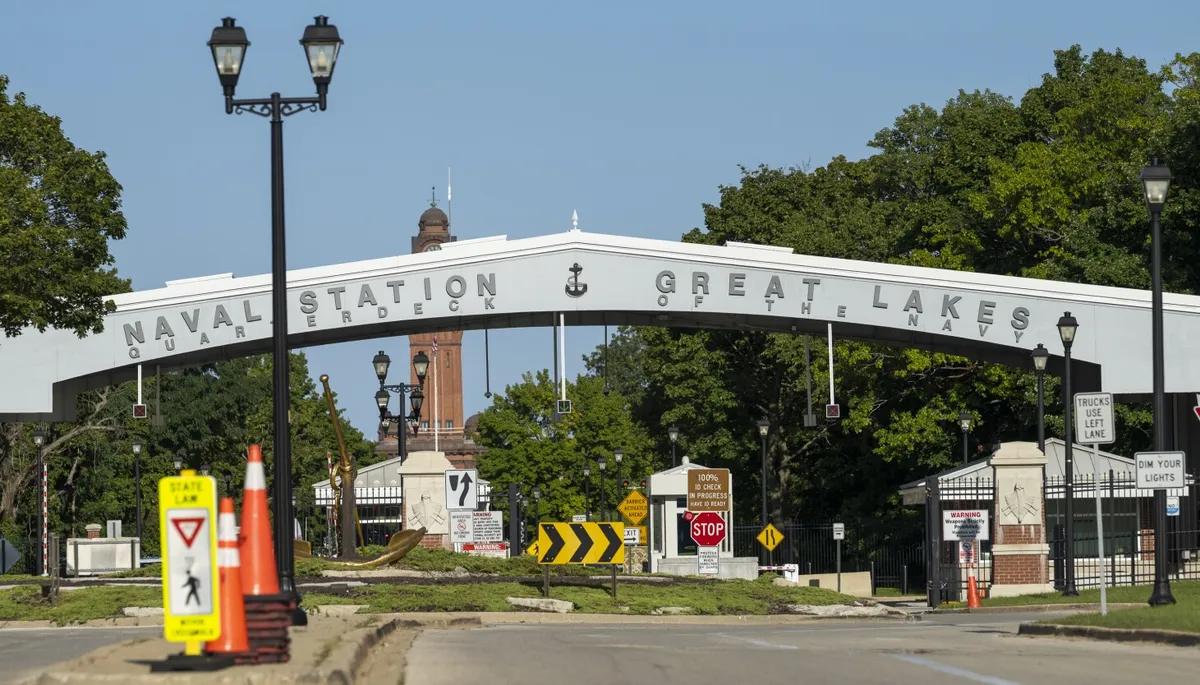
Federal immigration agents and potentially National Guard troops are set to operate from a suburban naval base as part of President Donald Trump’s initiative targeting Chicago. According to an email from Navy Captain Stephen Yargosz, agents from the Department of Homeland Security (DHS), U.S. Immigration and Customs Enforcement (ICE), and U.S. Customs and Border Protection (CBP) will be stationed at Naval Station Great Lakes near North Chicago from September 2 to September 30. This operation is expected to mirror similar actions taken in Los Angeles earlier this summer.
In his email, Yargosz mentioned that the operation would primarily target downtown Chicago. He indicated that there is a potential for support from National Guard units, although specific details remain scarce. The operation still requires formal approval from Defense Secretary Pete Hegseth, as confirmed by two sources familiar with the email. Local leaders have expressed significant concerns over the operation, emphasizing that they had not been informed about the planning stages.
Governor JB Pritzker and Mayor Brandon Johnson have both criticized the proposed deployment, arguing that it is unnecessary given the recent decline in crime rates. Senator Tammy Duckworth, a retired Army National Guard lieutenant colonel, criticized Trump's actions, stating, “Forcing the military, uninvited, into Chicago to intimidate Americans in their own communities does not make our nation stronger.” Duckworth further emphasized that this move could distract the military from its primary mission of safeguarding Americans from genuine threats.
Senator Dick Durbin echoed these sentiments, stating that state and local leaders did not request military assistance to address crime in Chicago. He argued that Trump's plans could lead to a misuse of government resources and would undermine military readiness at Naval Station Great Lakes.
While Pritzker’s office has declined to comment officially, he expressed skepticism about the motives behind Trump’s threats. “If this was really about fighting crime and making the streets safe, what possible justification could the White House have for planning such an exceptional action without any conversations or consultations with the governor, the mayor, or the police?” he questioned during a recent news conference.
The White House has refrained from commenting directly, deferring to immigration officials. Meanwhile, federal agencies such as DHS, ICE, and CBP have not responded to inquiries regarding the planned operations, nor has the Defense Department provided clarity.
In recent statements, President Trump has alternated between belittling local officials and urging Pritzker to request federal support. “I’m not a dictator, I just know how to stop crime,” Trump remarked during a televised cabinet meeting, asserting that the governor should seek his help on the matter.
In response to the potential federal deployment, Pritzker, Johnson, and Illinois Attorney General Kwame Raoul are exploring legal options. This follows Trump’s precedent of federalizing the police force in Washington, D.C., and deploying federal law enforcement agents and National Guard troops there.
Historically, Trump has targeted cities like Chicago, New York, and Baltimore for potential military interventions. Reports indicate that the Pentagon has been planning military actions in Chicago for several weeks, although the scope and legality of these operations remain uncertain. Sources have revealed that approximately 30 to 40 ICE agents have been conducting riot control practice at the military base, raising questions about the planned operation's scale.
As tensions rise over the proposed deployment of federal agents and National Guard troops in Chicago, local leaders remain in the dark about the planning process. With significant concerns surrounding the legality and implications of such actions, the situation continues to evolve, prompting ongoing discussions and potential legal challenges from state officials.